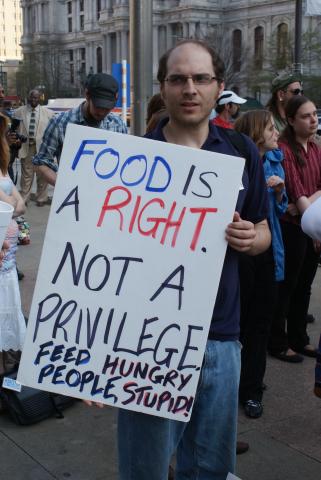Feed the Homeless in America, Get Fined or Arrested

VISIT MY NEW WEB SITE:
Contact at [email protected].
The state of homelessness in America is appalling, a largely unreported issue, the problem ignored by Washington, doing little or nothing to address it.
According to the National Alliance to End Homelessness, on any given night, over 550,000 Americans are homeless – forced to sleep outside, in an emergency shelter or transitional housing.
Homelessness is a poverty issue, affecting the working poor and unemployed – housing and rental costs increasingly unaffordable.
In 2014, around seven million Americans doubled-up with family or friends, for many prelude to homelessness.
A recent HUD report revealed increased homelessness last year, saying it comes at a time of an affordable housing crisis.
According to an Apartment List National Report, rents were higher in 89 of America’s 100 largest cities last year.
A 2017 National Law Center on Homelessness and Poverty (NLCHP) report, titled Housing not Handcuffs, said laws criminalized homelessness in 187 cities since 2006 – prohibiting sleeping in public places, living in vehicles and sharing food.
The NLCHP explained
“(a)lthough many people experiencing homelessness have literally no choice but to live outside and in public places, laws and enforcement practices punishing the presence of visibly homeless people in public space continue to grow.”
In too many places across America, the nation’s homeless are criminalized for their misery – instead of federal, state and local authorities taking responsible steps to alleviate the problem.
National Alliance to End Homelessness CEO Nan Roman explained “(u)nsheltered homelessness is on the rise, and major cities are feeling it most,” adding:
“Ending homelessness is a complex, long-term effort. For several years we’ve seen homeless systems become more efficient and effective and getting people into housing.”
“But the effectiveness of the homeless assistance efforts cannot make up for the increasing number of people who become homeless because they simply cannot afford housing.”
“In the short run, we will need more investment in effective homelessness programs. In the longer run, we need to address the increasing inability of poor and low income people to find affordable places to live.”
In California on a single night in 2016, over 20% of the state’s 39 million residents experienced homelessness – a shocking indictment of a major inadequately addressed issue.
New York City ranks highest in US homelessness, followed by Los Angeles, Boston, Washington, DC, San Francisco, and Phoenix.
The Chicago Coalition of the Homeless estimates around 125,000 Chicagoans experience homelessness over the course of a year – a major problem any time, a serious health issue in frigid weather.
Some cities prohibit feeding the homeless. Atlanta issues fines. So do Houston and Daytona Beach. Tampa arrests people feeding the homeless without permit permission.
According to the National Coalition for the Homeless (NCH), at least 33 US municipalities prohibit handing out free food.
El Cajon in suburban San Diego arrested 12 activists from the Break the Ban group for feeding homeless city residents. A 2017 ordinance prohibits it.
Volunteer Matthew Schneck said
“(i)f I’m going to be arrested for something, let it be for feeding the homeless.”
“It was absolutely necessary to beak this law until they were willing to enforce it, and, now that they have, we will continue this fight in court,” Shane Parmely stressed.
Mark Lane called the ban “an excuse,” explaining
“we have a problem with Hepatitis A, but you don’t battle that by not feeding homeless people.”
“You battle that by giving them proper restroom facilities, proper hand washing facilities, and vaccinations, education.”
The ACLU of San Diego & Imperial Counties condemned the arrests, executive director Norma Chavez Peterson saying:
“Dr. Martin Luther King was deeply concerned about ending poverty and hunger in America.”
“I have no doubt that if he were alive today, (he’d) stand with people who would share food with the hungry; and he would stand against those who would call this a crime.”
An uncaring nation is the real issue, serving its privileged class exclusively, largely ignoring hardships its most vulnerable people endure.
*
Stephen Lendman is a Research Associate of the CRG, Correspondent of Global Research based in Chicago.
VISIT MY NEW WEB SITE: stephenlendman.org (Home – Stephen Lendman). Contact at [email protected].
My newest book as editor and contributor is titled “Flashpoint in Ukraine: How the US Drive for Hegemony Risks WW III.”

